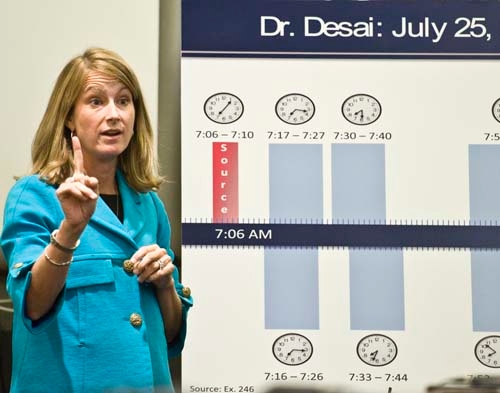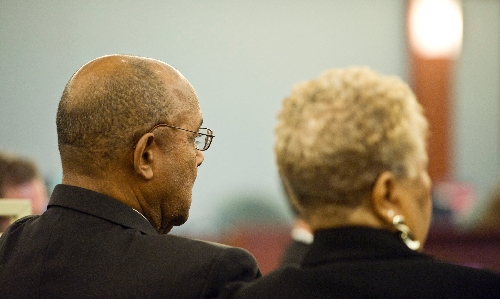Lawyers: Hepatitis C outbreak doesn’t happen if drug makers sell smaller anesthetic vials



Michael Washington never would have been infected with hepatitis C if drug makers had refused to sell large vials of a popular anesthetic to Dr. Dipak Desai’s clinics, Washington’s lawyer argued Monday during opening statements in the third civil trial stemming from Las Vegas’ hepatitis C outbreak.
Teva Parenteral Medicine Inc. and Baxter Healthcare Services knew that doctors and nurses around the world double-dipped with the 50-milliliter vials of propofol but did nothing to remove the cost-cutting temptation by refusing to sell the larger vials to outpatient clinics, lawyer Rick Friedman told the jury.
"They knew of the dangers, … and there were people in the company who were concerned about those dangers," he said.
Washington, 71, and his wife, Josephine, sued the drug companies under state product liability law, alleging they should have known that the 50-milliliter vials would be misused in endoscopy clinics, where typical procedures require less than 20 milliliters of the popular anesthetic.
Washington’s case hinges on the same issues that led to a record-setting $500 million verdict against the drug companies last year. But the Washington trial, and another one that started last month, differ from the 2010 trial in that, after a state Supreme Court ruling, the drug companies can give alternative theories of infection and use the "dirty doctor" defense to lay blame on the medical professionals misusing their drug.
Local health officials said the hepatitis outbreak was caused by nurse anesthetists who were reusing propofol vials among patients after they had become contaminated by syringes that were reused on patients infected with hepatitis C.
Authorities have charged Desai and two nurse anesthetists with multiple felonies stemming from the outbreak.
During Monday’s hearing, drug company lawyers told jurors that the people responsible for Washington’s infection were Desai and his staff.
Baxter lawyer Jennifer Levy called Desai’s practices "reckless" and compared them to driving on the wrong side of the freeway.
"The wrong defendant is on trial," Levy said. "This isn’t a case of a defective product. It’s a case of medical misconduct."
Washington’s lawyer argued that the misuse in Desai’s clinics was happening in clinics around the world because they were sold the 50-milliliter vials and had a financial incentive to use the vials among patients though they were labeled "single patient use only."
"If you multidose, you can get every last drop," Friedman said.
Multidosing of propofol was linked to 23 infectious disease outbreaks across the globe in recent decades, he said.
"Over and over again, doctors and nurses made mistakes that could have been prevented if only they sold 10- and 20-milliliter vials," Friedman said of the drug companies.
The manufacturer had a financial incentive to sell the larger vials because they made more profit per bottle than the smaller vials, he said.
Teva lawyer Glenn Kerner also laid the blame on Desai, who he said had "grossly misused" the propofol contrary to warning labels, medical training and common sense.
"What went wrong begins and ends with Dr. Desai and his clinics," Kerner said.
Teva and Baxter never emphasized one size vial over another, but doctors preferred having the 20- and 50-milliliter vials, so Teva stopped making the 10-milliliter vials, Kerner said.
Teva gave medical professionals the choice to use whatever size they deemed appropriate for their patients in their clinics, the lawyer said. Any vial size is unsafe if it’s misused, he said.
"There’s no question if Dr. Desai had followed instructions and common sense, there was no chance of infection," Kerner said.
He also noted hygiene problems at the clinics, including nurse anesthetists who didn’t wear gloves and improper cleaning of endoscopes between procedures, that were "so bad, so disgusting and so dangerous to the community of Las Vegas," Kerner said.
He said the unclean endoscopes could have been a possible mode of infection.
But no matter whether jurors believe the hepatitis C virus had infected Washington through a tainted syringe or an unclean scope, Desai was responsible, Kerner said.
"This situation was entirely unavoidable if Dr. Desai and his clinic had done their job," he said.
Contact reporter Brian Haynes at bhaynes@ reviewjournal.com or 702-383-0281.












